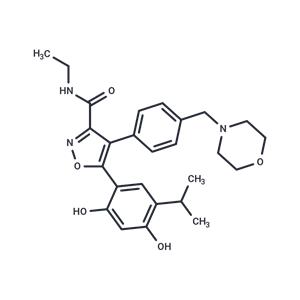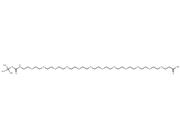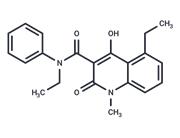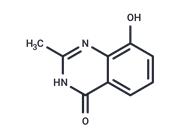| Name | Luminespib |
| Description | Luminespib (VER-52296) is an HSP90 inhibitor that inhibits HSP90α and HSP90β (IC50=7.8/21 nM). Luminespib has antitumor activity and is used in studies of head and neck tumors, among others. |
| Cell Research | Cell lines were grown in DMEM/10% FCS, 2 mmol/L glutamine, and nonessential amino acids in a humidified atmosphere of 5% CO2 in air. All lines were free of Mycoplasma. Cell proliferation was determined using the sulforhodamine B (SRB) assay for tumor cells and prostate epithelial cells, the WST-1 assay for MCF10A and HB119, or an alkaline phosphatase assay for HUVEC and HDMEC. GI50 was the compound concentration inhibiting cell proliferation by 50% compared with vehicle controls. Cell cycle analysis was as described. Active caspase-3/7 was measured using a homogenous caspase assay kit [1]. |
| Animal Research | In vivo, pharmacokinetic studies in female NCr athymic mice bearing WM266.4 human melanoma xenografts were essentially as described. NVP-AUY922 was dissolved in DMSO and diluted in sterile saline/Tween 20. A single dose of 50 mg/kg NVP-AUY922 was given i.v. or i.p. and groups of three animals were taken at intervals for pharmacokinetic analyses [1]. |
| In vitro | METHODS: H. pylori infected GES-1 cells were treated with Patchouli alcohol (5-20 µg/mL) for 24 h. Apoptosis was detected by flow cytometry.
RESULTS: Patchouli alcohol treatment significantly reduced H. pylori-induced apoptosis. [1]
METHODS: H. pylori-infected GES-1 cells were treated with Patchouli alcohol (5-20 µg/mL) for 24 h. Cytokine levels were measured by ELISA.
RESULTS: Treatment with 5-20 µg/mL Patchouli alcohol significantly reduced the production of TNF-α and MCP-1. [1] |
| In vivo | METHODS: To study the effect on H. pylori-associated gastritis, Patchouli alcohol (5-20 mg/kg) was administered orally to H. pylori infected mice once daily for two weeks.
RESULTS: Patchouli alcohol treatment increased SH-NP content and CAT activity and significantly protected the gastric mucosa from H. pylori-induced damage. [1] |
| Storage | store at low temperature | Powder: -20°C for 3 years | In solvent: -80°C for 1 year | Shipping with blue ice/Shipping at ambient temperature. |
| Solubility Information | DMSO : 16.67 mg/mL (35.81 mM), Sonication is recommended.
Ethanol : 29 mg/mL (62.29 mM), Sonication is recommended.
H2O : < 1 mg/mL (insoluble or slightly soluble)
10% DMSO+40% PEG300+5% Tween 80+45% Saline : 8.6 mg/mL (18.47 mM), Solution.
|
| Keywords | VER52296 | VER 52296 | NVP-AUY-922 | NVP-AUY 922 | Luminespib | Inhibitor | inhibit | HSP90β | HSP90α | HSP | Heat shock proteins | AUY-922 | AUY 922 | Autophagy | Apoptosis |
| Inhibitors Related | Stavudine | Cysteamine hydrochloride | Sodium 4-phenylbutyrate | Hydroxychloroquine | Guanidine hydrochloride | Tributyrin | Paeonol | Naringin | L-Ascorbic acid sodium salt | Alginic acid | Gefitinib | Dextran sulfate sodium salt (MW 5000) |
| Related Compound Libraries | Target-Focused Phenotypic Screening Library | Bioactive Compound Library | Membrane Protein-targeted Compound Library | Autophagy Compound Library | Anti-Cancer Clinical Compound Library | Drug Repurposing Compound Library | Inhibitor Library | Anti-Aging Compound Library | Bioactive Compounds Library Max | Anti-Cancer Compound Library | Anti-Cancer Drug Library | Anti-Cancer Active Compound Library |

 United States
United States






